After the first round of the 2012 Egyptian presidential elections, I was standing in Midan El Nafoura in The middle class neighborhood of El Mokattam in Cairo as a part of a “human chain” that supported Mursi feeling proud to be acting as a proactive citizen.
But to the by-passers I was an unveiled woman holding a slogan that said “ Ana mesh ikhwan bas hantekheb Mursi “ (I’m not a member of the Muslim Brotherhood but I will vote for Mursi) A few men walked by and rhetorically asked ,“how is it that you’re not wearing a hijab and yet you’re voting for Mursi?” Others applauded my decision because, despite my dress code, I was still voting for the Muslim Brotherhood.
Hearing these comments, the only question I was asking myself was ‘what does my hijab have to do with my political choices?’ My religious views and my opinion on hijab did not influence my opinion for whom to vote, but apparently I didn’t look Muslim enough for some people.
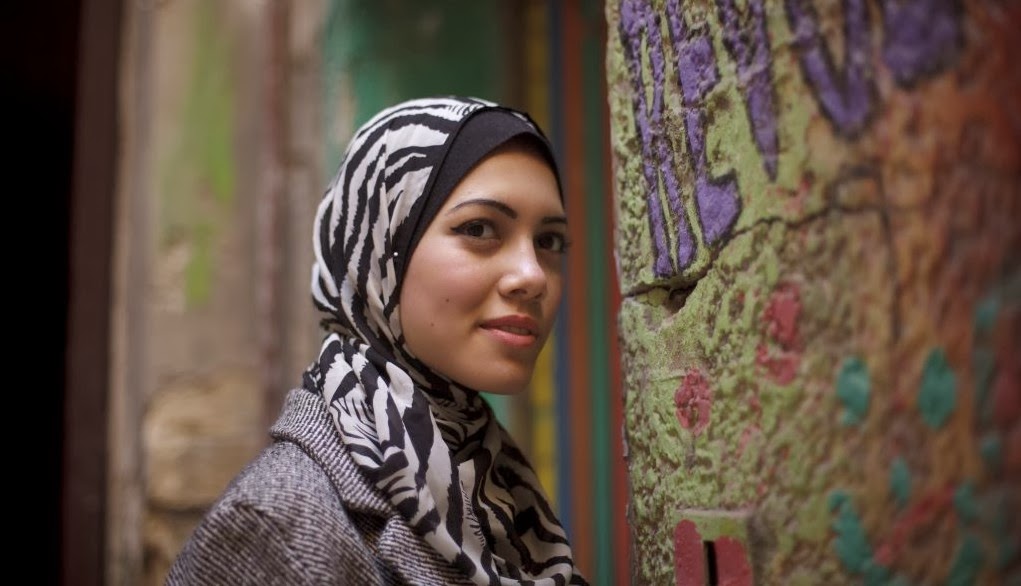
A photo of me holding the slogan was all over Facebook the next day. I read most of the comments; I wasn’t shocked by the people swearing at me for my political choices, but by those who jumped to the conclusion that I was a respectable person because in spite of apparently being a Christian I was still going to vote for Mursi!
I put the hijab on when I was thirteen simply because I believed it was the right thing to do. I had a multi-layered battle with the hijab but after having worn it for more than ten years, I decided I want to go on a journey of discovering myself and so I took it off.
Aside from someone meeting me for the first time after I’ve taken it off, I had never felt so conscious of my uncovered head like I did during the human chain. I had no idea it was so important that I be labeled. I had no idea it was an issue that I now walk the streets of Cairo with my religious identity kept to myself.
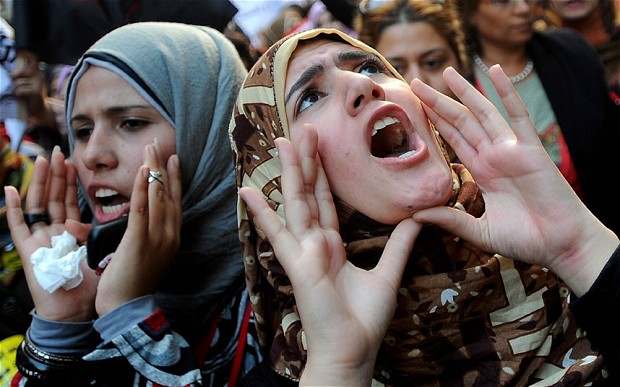
I am not writing this article to discuss whether or not the hijab is obligatory for Muslim women, neither am I going to share with you my story since I’ve taken it off. I am writing this article because it’s fascinating how much a piece of cloth can do to a woman. How much of a role does a woman’s hijab really play in how society defines her and how she defines herself?
The previous question does not only pertain to political settings, but also to the workplace and the street. When the Four Seasons hotel interviewer bluntly told A.H. that he would give her the job only if she took off her hijab, he set a great example of how veiled women are defined in the professional setting in Egypt: under-qualified and not presentable.
On the other hand, 26 year-old Sara Imam, who doesn’t wear the hijab, was asking a man directions on the street, but before naming her destination he automatically assumed she was Christian and started describing the way to the nearby church.
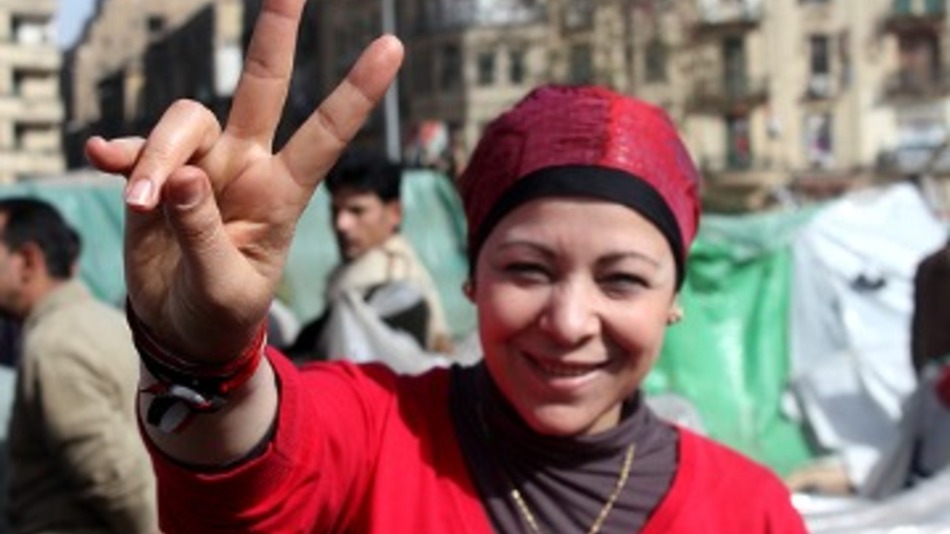
When society automatically assumes that you’re a “good” girl, or that you’re Christian or that you’re not qualified all because you’re covering or not covering your head, is this not cultural mass production of Muslim women? Does not the definition of society of what wearing or not wearing the hijab should entail deprive Muslim women of their individuality?
When 32 year- old A.H. used to put on her hijab, it was more than just covering her now flowing blonde curly locks, she felt like she put on a mask. The hijab conditioned her to speak, dress and behave in a certain way. Her now echoing laugh was deemed “inappropriate” by friends when she was veiled.
With all the social restrictions that came with the hijab, A.H. felt that putting it on automatically striped her off her identity. She felt she was like all the other women.
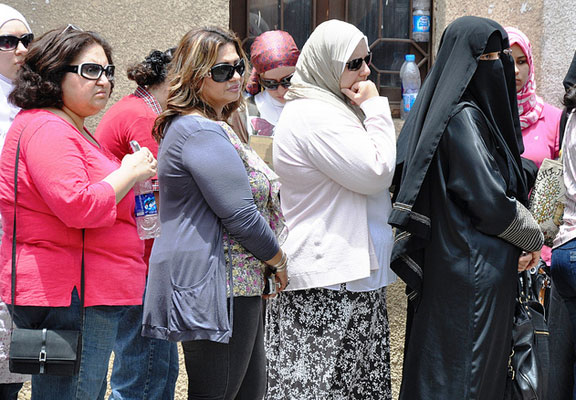
Women are obviously obliged to cover all but their face, hands and feet when they choose to wear the hijab, but are the cultural obligations that come with hijab necessary? Do they truly reflect religion? Why is it that veiled women have to become cultural, religious and intellectual carbon copies of each other?
Human beings are intrinsically different, if they choose not to look differently, should they not at least be allowed to act and think differently? Why should Muslim women appear like they’ve all been mass produced?
In an attempt to escape this mass production, women who wear the hijab often try to personalize it. They sometimes follow the latest fashion trends or they adapt it according to the weather or to the event they’re going to and that’s when another interesting type of judgment occurs.
S.R. is a 37-year old English teacher who wears the hijab herself hesitantly told me that she doesn’t approve of girls who have a veil on but wear really tight clothes or sometimes even see-through ones.Ironically, S.R.’s role was reciprocated when a family member disregarded her properly- all- hair- and neck-covering veil, her loose and almost-knee length blouse and told her that she shouldn’t be wearing pants; that it’s not appropriate.
S.R. says that she knows that a lot of women don’t wear the hijab out of conviction but she believes that there is an “appropriate” way to wear it and to behave when wearing it. She believes in ‘each to their own’ but sometimes she can’t help but judge “inappropriately” veiled women.
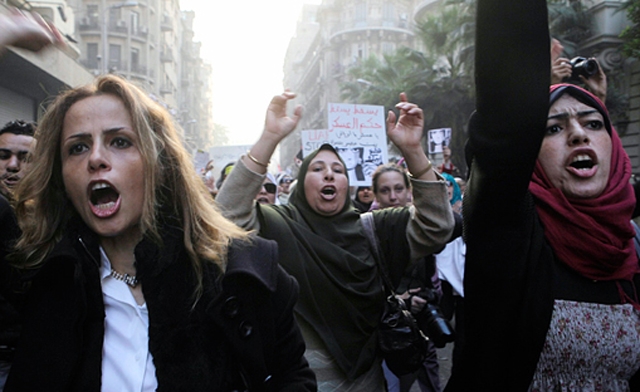
Twenty four-year old Nesma A. has always personalized her hijab- in an extreme way perhaps. She used to wear a bikini to the beach when she worked in Sharm El Sheikh; she says she wears the hijab not because it’s an obligation, but because she feels comfortable wearing it. She also wore a wig to her metal concert because she couldn’t imagine herself playing the keyboard with her hijab on.
Maybe the reason why Nesma is untraditionally maneuvering around society’s cultural definition of wearing the veil is because she was severely judged in the past.
When in high school, one of Nesma’s friends stopped talking to her, because her father told her so. There was a rumor that Nesma smoked cigarettes. But when Nesma upgraded from a hijab to a “khimar” her friend was automatically allowed to talk to her again. And that’s when Nesma took off the khimar, because she was appalled by how easily she was judged according to her dress code.
In a somewhat similar incident, Sara Imam says that when she took off the hijab after having worn it for 8 years, some people automatically assumed that she had gone through some trauma and was acting out, or that she had simply chosen to walk away from God.
If a man shaved his beard, society won’t necessarily assume that he walked away from God but if a girl took off the hijab some people would assume that she has. In a way, even girls who take off the hijab are also culturally mass produced.
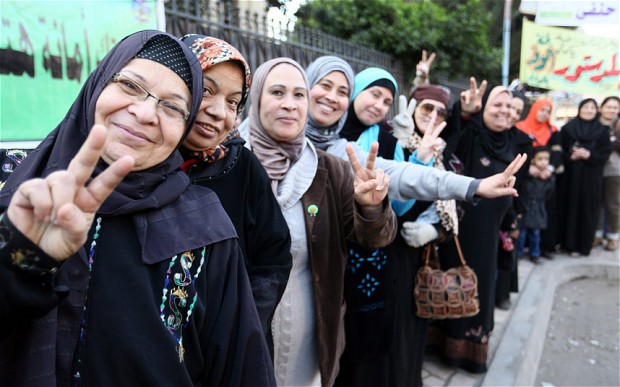
When society dares pass judgment on an unveiled woman, does it ever re-think its role in the woman’s decision?
Sara first started questioning aspects of Islam when she traveled abroad and found that the major justification for wearing the hijab is completely irrelevant. Arab societies argue that the hijab prevents women from being harassed and from being treated as mere bodies, yet the contradiction of that statement happens on the streets of Egypt every day.
When Sara saw that in Western countries women are treated with respect regardless of what they wear, she started to doubt what she thought was fundamental to her religiosity. A.H. wore the hijab because her now ex-husband asked her to. He prayed five times a day, had a beard and always spoke about what’s “haram” and what’s “halal” in between hitting her, calling her names and not bringing in any money.
It is these hypocrisies that plague our society that played a big role in why A.H. and Sara took off their veils and not their moral or religious failings.
Creativity in our society is rarely found because individuality has always been attacked and under-appreciated. Most Egyptians have always found comfort, or were taught to always find comfort in similarities and stagnation.
Our government has never encouraged personal interpretation, of anything. We have, for a very long time, been forced to be intellectual and religious carbon copies of each other and those of us who couldn’t fight their individualistic screams were deemed outcasts. The issue of a woman’s hijab is no different.
I have channeled the stories and opinions of very few women in this article. And as I finish writing it, I think about all of the other women who have different stories to tell; women from different social classes, educational backgrounds and religious beliefs who could spur on an entirely new article. Nevertheless, the women here do represent some Egyptian women and do put forth issues that need to be dealt with and cured in our very troubled society.
This article was originally published in 2012.



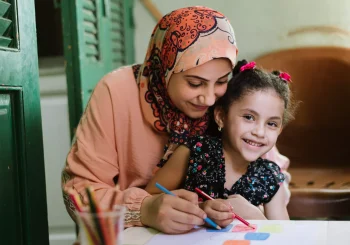


Comments (9)
Why is hijab always the center of attention when women issues are discussed? Also why is the religion of Al Islam seem to carry the brunt of blame for some women who have exercised their decision to wear the hijab or take it off? I think cultural orientation especially here in Egypt is the cause for the gross misunderstanding of this issue. Hijab is not merely a rag on someone’s head…it is indeed a way of life. So the bare-headed dames need to keep moving with their criticisms and those who are wearing the hijab need to remain astutely aware of the reason(s) why they have chosen to wear it. Too much precious time has been spent with this rhetorical discussion. If a person feels no apprehension about committing a certain act, then go right ahead and do it! Don’t create a belabored argument to seek approval of your uncertainties. Those who do wear the hijab do not qualify to criticize those that don’t either. A person should be left to make informed decisions and be prepared to deal with the subsequent outcomes…kalas!
thanks for this very interesting article.